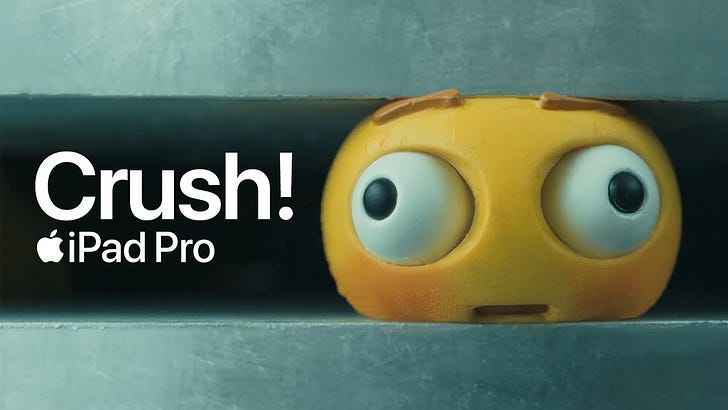My friend and I were having a long chat, our occasional sparring over whatever occupied our minds. These days, it’s AI. I’m usually in my corner, giggling about the joys of AI and the human flourish ahead, while retaining some hesitation about its potential Chernobyl-level consequences spread globally. My friend, ever the cynic, tightens his gloves to disagree with any view that ascribes human qualities to AI. For him, the current language of anthropomorphising AI is as immoral as replacing a human child with a toy. And he would not entertain any notion that whatever is designed by a research lab can be more creative than him.
In the middle of that, he asked if I’d seen the new Apple ad for iPad Pro and sent the link. (Context: I’m an ex-advertising creative director with more than a healthy infatuation with creative storytelling. My friend, still in the game, is cutting it in North America working with brands that every creative dreams about. Including Apple).
I watched the ad and immediately expressed my disgust, typing, “An Apple ad I deeply dislike!!”. But WhatsApp doesn’t yet have a feature to allow telepathic conversations and I resisted letting emojis and memes to caricature my reaction. He would have sensed the horror under my skin.
Why don’t I like the ad? Because the metaphor is flawed! Granted, it demonstrates the iPad Pro’s thinness by crushing objects under a hydraulic press. Fair enough. But, as far as metaphors go, this falls flat in holding up meaning with the other side of interpretation.
Crushing a guitar, sculpture, trumpet, piano, books, camera, paint cans, etc. to demonstrate a techno alternative? Mr. Cook, this ain’t cooking! The crushed objects were invented as tools but through time, some became consecrated in the grand canvas of human creativity. They’re everyday tools but we intuitively think they’re special too. It isn’t that we shouldn’t have more sophisticated alternatives, it’s that we shouldn’t desecrate the traditions imbued with emotional, sentimental, and indeed, spiritual value - against the modern orientation where every-god-damn-thing is reduced and measured by their utilitarian value.
And this is symptomatic of an issue that looms large. We bulldoze cathedrals to make room for brutalist skyscrapers because tax-paying corporate shops have more economic value than sanctuaries of solitude and togetherness. Or what’s the fuss about organic produce when GMOs guarantee efficient assembly lines for labour and tax and quicker allocations on supermarket shelves? Humanity continues aborting itself on the table of economic incentives.
Back to this Apple ad. My bet - it will go down as the anthem for the soulless, nihilistic age of the machine, a reminder of a world primed only for efficiency and profit, where everything is emptied and decontextualised to fulfil narrow goals.
One of my all-time favourite ads - “Think Different” is from Apple. You wonder what happened to the company that understood telling brand stories built on verities and essence without undermining values. Sure, that was a brand/positioning campaign separate from product. But there were the days of “Get a Mac” and #ShotOniPhone - demonstrations done with flair and subtlety. My beloved Apple seems antithetical these days.
My friend argues Apple shouldn't have presented the iPad as the ultimate alternative to tactile objects of creativity but as a tool of enhancement since the iPad is also tactile. I agree, like how I love my Kindle and the convenience it brings without the reminder that it’s designed to replace books which then offends the historical value of Gutenberg’s miracle. My relationship with my Kindle doesn’t undermine my reverence for physical books.
And Apple should have read the room. The world is currently sceptical about AI and is under the throes of machines replacing us despite the utopian promises of convenience. My friend wondered how the ad passed stakeholder reviews without anyone raising concerns. I said maybe an intern did, but interns’ voices carry low bandwidth. 🙂
“Think Mediocre” isn’t what I associate with Apple.
But I’m crushed.




I love the emotion in your write-up, possibly because I agree wholeheartedly that technology should not trump traditional tools that enhanced creativity in the pre-digital era.